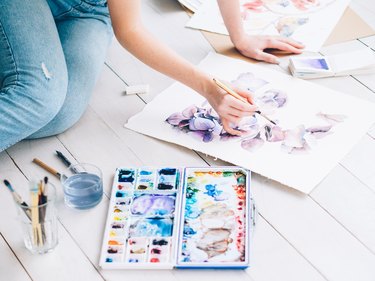
If mantras or mindful breathing aren't your vibe, that's OK. When it comes to managing your mental health, the best therapies are the ones that work for you.
Sure, some people swear by meditation, and yes, sometimes that involves word repetition or deep breathing. Meditation can be calming and has been shown to benefit overall health and wellbeing, according to the National Center for Complementary and Integrative Heath (NCCIH). But it's not for everyone. In fact, mental health statistics suggest that meditation, in rare cases, may even cause or worsen symptoms of anxiety and depression, according to the NCCIH.
Video of the Day
Video of the Day
That's where alternative therapies come in, and there are quite a few. Finding a therapeutic approach that resonates with you is part of the wellness journey.
Here are a few non-traditional methods worth considering.
Tip
As with any new therapy, you should consult your health care provider before going all in.
1. Music Therapy

Making or listening to music may be an effective tool for tuning up your mental health. It helps people explore their thoughts and feelings, according to the American Psychological Association.
Music therapy can ease treatment- or illness-related anxiety, and there may be short-term benefits for people with depression, too, per the NCCIH. And, adding music therapy to "treatment as usual" improved depressive symptoms and anxiety, compared with usual care alone, according to a November 2017 analysis published by the Cochrane Database of Systematic Reviews.
2. Art Therapy
This therapeutic approach transcends the limits of language, according to the American Art Therapy Association. In other words, it gives people a different way to express their feelings, symptoms or emotions, according to a May 2019 review in the journal Psychiatric Research.
Jill McNutt, PhD, a board-certified, licensed art psychotherapist and licensed professional counselor at the Art Therapy House in Brown Deer, Wisconsin, tells LIVESTRONG.com that she works with clients to establish their personal story, then deconstruct areas of discomfort and, ultimately, "rewrite" that story.
"Through imagery creation, reflection and re-creation, clients renegotiate their relationship with psychological states like anxiety and depression," McNutt says.
Four studies showed "significant reductions" in depressive symptoms, compared with baseline measures, following eight- to 12-week art therapy sessions, according to the Psychiatric Research review.
Related Reading
3. Equine Therapy

If working with horses appeals to you, you might find this form of animal-assisted therapy to be quite soothing. Small studies and anecdotal evidence show that it can reduce symptoms of anxiety and depression, according to NAMI.
Is it as effective as traditional psychotherapy? That remains unclear. An August 2019 review published by the Canadian Agency for Drugs and Technologies in Health identified just one relevant study: After six weeks of equine therapy, 10 U.S. veterans with PTSD showed no significant improvement in symptoms, resilience or stress levels compared with a control group, according to the January 2019 study in the Journal of Integrative Medicine.
There were no such studies comparing the effectiveness of equine therapy alone or as an add-on to traditional treatment for anxiety and depression, the Canadian agency noted.
4. Dance Movement Therapy (DMT)
No, this is not about a night at the club. DMT is a type of psychotherapy that uses body movement as a non-verbal language, according to the American Dance Therapy Association.
"In the therapeutic setting, movements and the way they are conducted are an expression of emotions," explains Silvia Birklein, PhD, a licensed clinical psychologist, board-certified dance movement therapist and founder and director of SYNC Psychological Services in New York City.
The therapist, for instance, might non-verbally attune to her client's body rhythm using a technique called "mirroring." People feel "seen and understood in what they are experiencing," Birklein tells LIVESTRONG.com. She says it "creates a feeling of 'being in there together': it breaks through the isolation of depression."
Related Reading
5. Ecotherapy

When's the last time you communed with nature? If you have anxiety, depression or PTSD, you might consider harnessing the power of the great outdoors.
"Ecotherapy" encompasses numerous therapeutic approaches. How about a trail walk in the woods or outdoor cycling?
There's evidence that these types of activities can lead to positive improvements in health, per a January 2011 systemic review in the Scandinavian Journal of Public Health.
Walking in nature, versus an urban setting, reduces activity in the region of the brain associated with ruminating over negative thoughts, according to Harvard Health Publishing. Spending time in nature may also lower blood pressure and cortisol levels, per Harvard Health Publishing.
Related Reading
- National Alliance on Mental Health: "Complementary Health Approaches"
- National Center for Complementary and Integrative Health: "Meditation: In Depth"
- University of Michigan Depression Center: "Sticking With Your Treatment"
- University of Michigan Depression Center: "Empower Yourself"
- American Psychological Association: "Alternative Techniques"
- NCCIH: "Anxiety At a Glance"
- NCCIH: "Depression and Complementary Health Approaches: What the Science Says"
- Cochrane Database of Systematic Reviews: "Music Therapy for Depression"
- American Art Therapy Association: "About Art Therapy"
- Psychiatric Research: "Creative Art Therapy for Mental Illness"
- Canadian Agency for Drugs and Technologies in Health: "Canine and Equine Therapy for Mental Health: A Review of Clinical Effectiveness"
- Journal of Integrative Medicine: "Efficacy of Equine-assisted Psychotherapy in Veterans with Posttraumatic Stress Disorder"
- American Dance Therapy Association: "What Is Dance/Movement Therapy?"
- Scandinavian Journal of Public Health: "Nature-assisted therapy: Systematic review of controlled and observational studies"
- Harvard Health Publishing: "Sour Mood Getting You Down? Get Back to Nature"
Is this an emergency? If you are experiencing serious medical symptoms, please see the National Library of Medicine’s list of signs you need emergency medical attention or call 911.